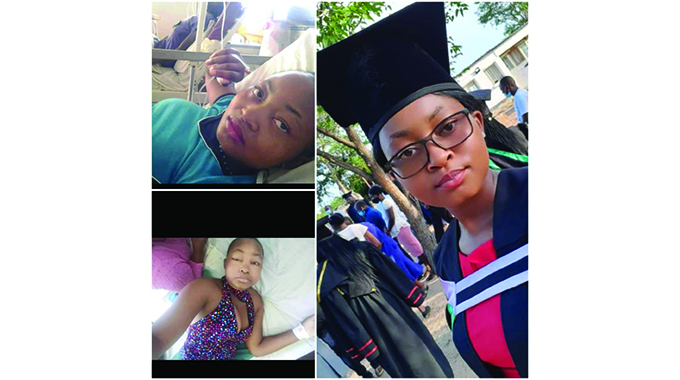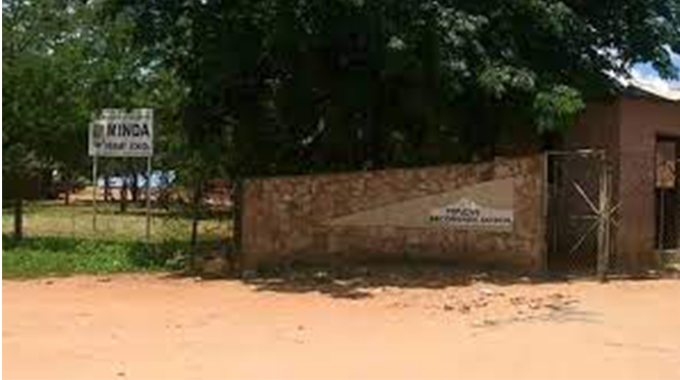The Chronicle

Flora Fadzai Sibanda, Chronicle Reporter
TWICE daily, Miss Natalie Mbewe (25) injects herself with insulin.
She has been living with type one diabetes since the age of 11, but that has not stopped her from making the best out of her life and injecting herself religiously.
Miss Mbewe manages her diabetes by injecting herself with Actraphane insulin twice a day: once in the morning and once in the evening.
“For a diabetic person, insulin every day keeps you away from the doctor. So getting it without skipping any dosage is very important,” she said.
 Natalie Mbewe living with diabetes
Natalie Mbewe living with diabetesDiabetes is caused by inadequate production of insulin, or insulin resistance and it is categorised into two types. Type one which is usually diagnosed in children, teens, and young adults is caused by an autoimmune reaction that stops the body from making insulin, while type two is a serious condition where the cells don’t respond normally to insulin, or your pancreas can’t make enough insulin.
Symptoms of diabetes include frequent urination, excessive thirst or hunger, and weight changes.
A Chronicle crew visited Miss Mbewe at her home in Nkulumane suburb yesterday on the occasion of World Diabetes Day.
The day has been commemorated every year on November 14 since 1991. Miss Mbewe said she was in Grade 7 at Thomas Coulter Primary School in Hwange in 2012 when she started losing weight.
Miss Mbewe said her family suspected she was pregnant.
“I remember on the 12th of May 2012 l woke up with serious stomach cramps and throwing up. I could not go to school on that day so my mother rushed me to the nearest hospital. When we got there, the doctors ran all the possible tests on me except for diabetes because by then glucometers were not common in most hospitals,” she said.
A glucometer is an instrument for measuring the concentration of glucose in the blood.
Miss Mbewe said while at hospital she told her mother that’s she had been having sticky urine and doctors decided to conduct blood and urine tests.
“I was told my results were back and l was diabetic,” she said.
Miss Mbewe said when she was discharged from hospital, she was just told that she had to inject herself and she could not eat certain types of food.
“I had to go through the discrimination of being questioned about me injecting myself through high school because my mother sent me to a boarding school, Minda High School. After high school l had to re-adjust at Great Zimbabwe University,” she said.
 Great Zimbabwe University
Great Zimbabwe UniversityMiss Mbewe said going through high school and university helped her grow as a diabetic patient because it taught her that no matter which stage of life one is going through, taking care of one’s health is very important.
She said she was lucky to also get teachers and lecturers who understood she was diabetic and would occasionally need a snack to keep her sugar levels in check.
In 2020, she said she had a near death experience when she developed a wound on her back which grew.
“Because l am diabetic it means my immune system is very weak. l developed a wound when l was in my last year at university. Initially, I thought it would heal but it deepened and ended up being a 12-centimetre-deep wound such that l could easily see the spinal cord. It was bad l had to be hospitalized for over four months as the doctors were monitoring the wound as they feared it would turn cancerous should it not be carefully treated,” she said.
Miss Mbewe said being diabetic has never been a hindrance for her as she is a recent social work graduate and is currently working for a local organization.
Instead, she said the chronic disease has taught her to take good care of her health and to always monitor it.
 Public health
Public health“I know there are some things that l cannot eat. I am always going for checkups to see if my vital organs are still intact because l cannot afford to fall sick due to my weak immune system,” she said.
Miss Mbewe said she hopes that one-day people will be able to receive insulin for free in hospitals because the medication is expensive, especially for people who are not working.
“We also need awareness campaigns so that people are taught about diabetes. There are people who still think diabetes is sexually transmitted and that is a bad thing for us as youth because it means we are not moving forward,” she said.
Another diabetes patient, Mr Tinotenda Dzikiti (26) said insulin and injections are very expensive because one can spend over US$30 a month depending on the medication plan they are on.

“A person cannot miss an insulin even for a day because that can mean death. Celebrating this day is very important for us diabetic people because it’s a day that we get to advocate for free diabetic medication and educate more people on diabetes,” he said.
Mr Dzikiti said he was diagnosed with the chronic illness in 2010 when he was in Form One.
He said he was the first person in his family to get the diagnosis.
“At first it was difficult to understand that l had diabetes because there was no one to teach me about diabetes. As such, l was not even keen on talking about diabetes and telling people that l had it,” he said.
“I manage my diabetes by injecting insulin daily.”
Mr Dzikiti said his mindset was changed in 2019 when he started being involved with Diabetes Association of Zimbabwe.
 Minda High School
Minda High School“In 2019 I was chosen as one of the people to go and represent Zimbabwe in Ethiopia at the Young Leaders Living with Diabetes conference. This is where l got a lot of information about diabetes and decided l want to be a peer educator and educate youths about diabetes,” said Mr Dzikiti.
He is now also the ambassador for the International Society for Pediatric and Adolescent Diabetes, a member of the Young Diabetes Federation and has his own podcast that seeks to empower, inspire, encourage and educate the community about managing diabetes.
He said he wishes more people, especially the young, could be taught more on diabetes.
“Youths think once a person gets diabetes they will be now limited in life and they cannot do much anymore. They even go as far as thinking because they are young they cannot get diabetes. But we have children as young as five who get diagnosed with the illness,” he said.
Zimbabwe Diabetic Association national coordinator Mr Keith Vitrino said his organization supports people who are living with diabetes.
“We have social workers in our communities who identify the most vulnerable people that are in need of medication. After identifying them will help them with medication and the glucometer,” he said.
He said diabetes is not a death sentence if managed properly.
“One can live a normal lifespan only if they are educated and are able to manage the condition. That is why we have camps where people below the age of 25 living with diabetes come together to support each and teach each other about diabetes,” said Mr Vitrino.
@flora_sibanda
Article Source: The Chronicle
